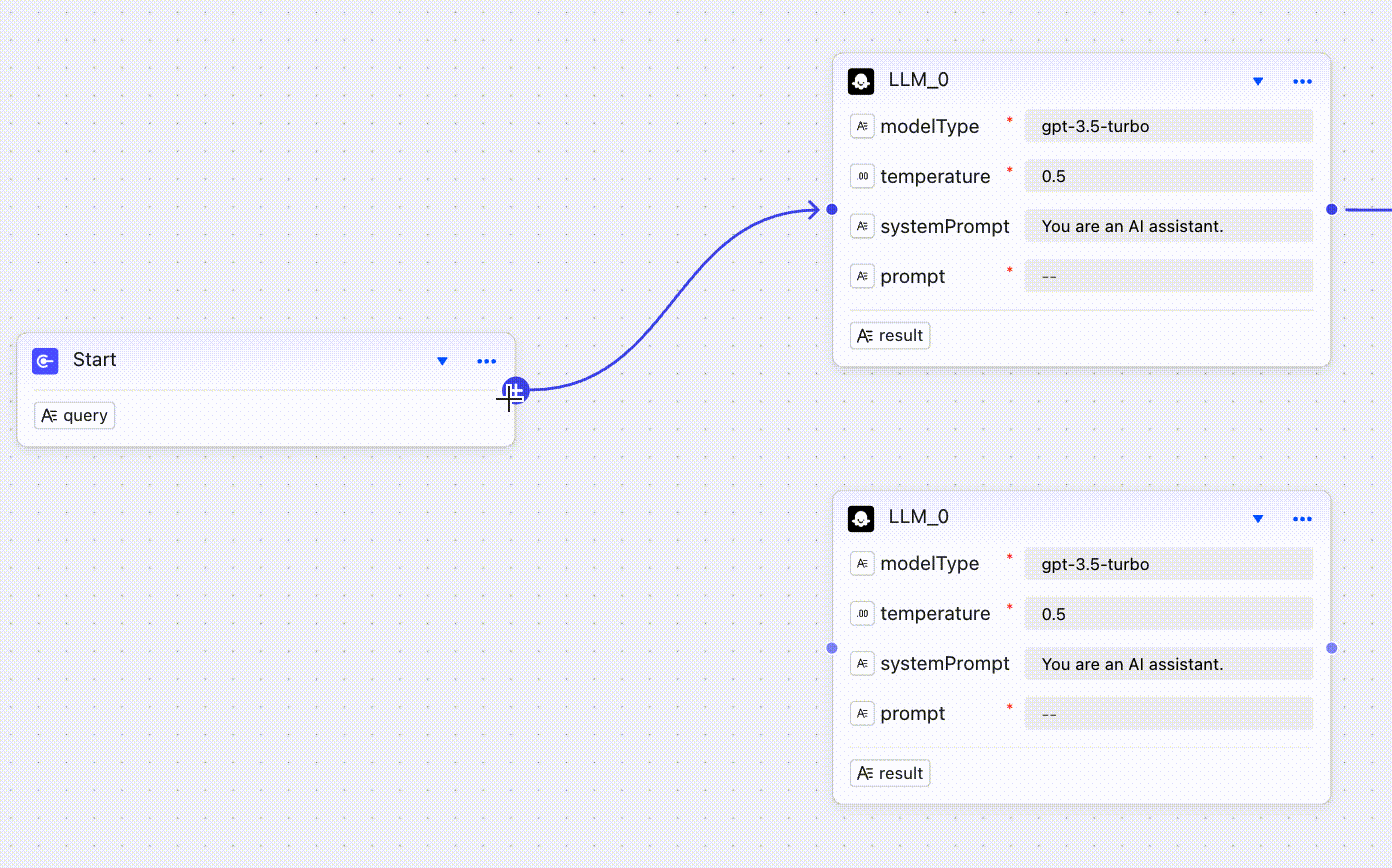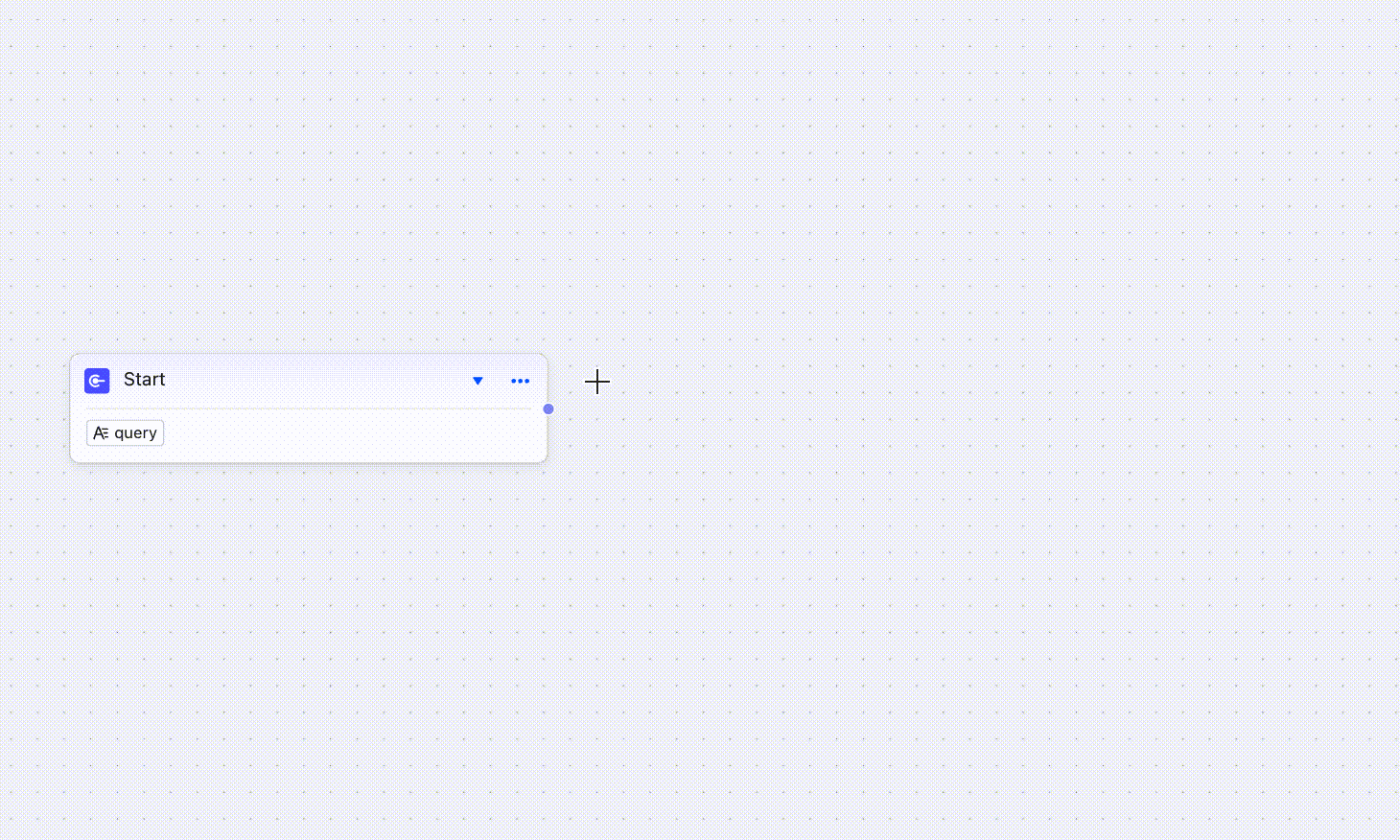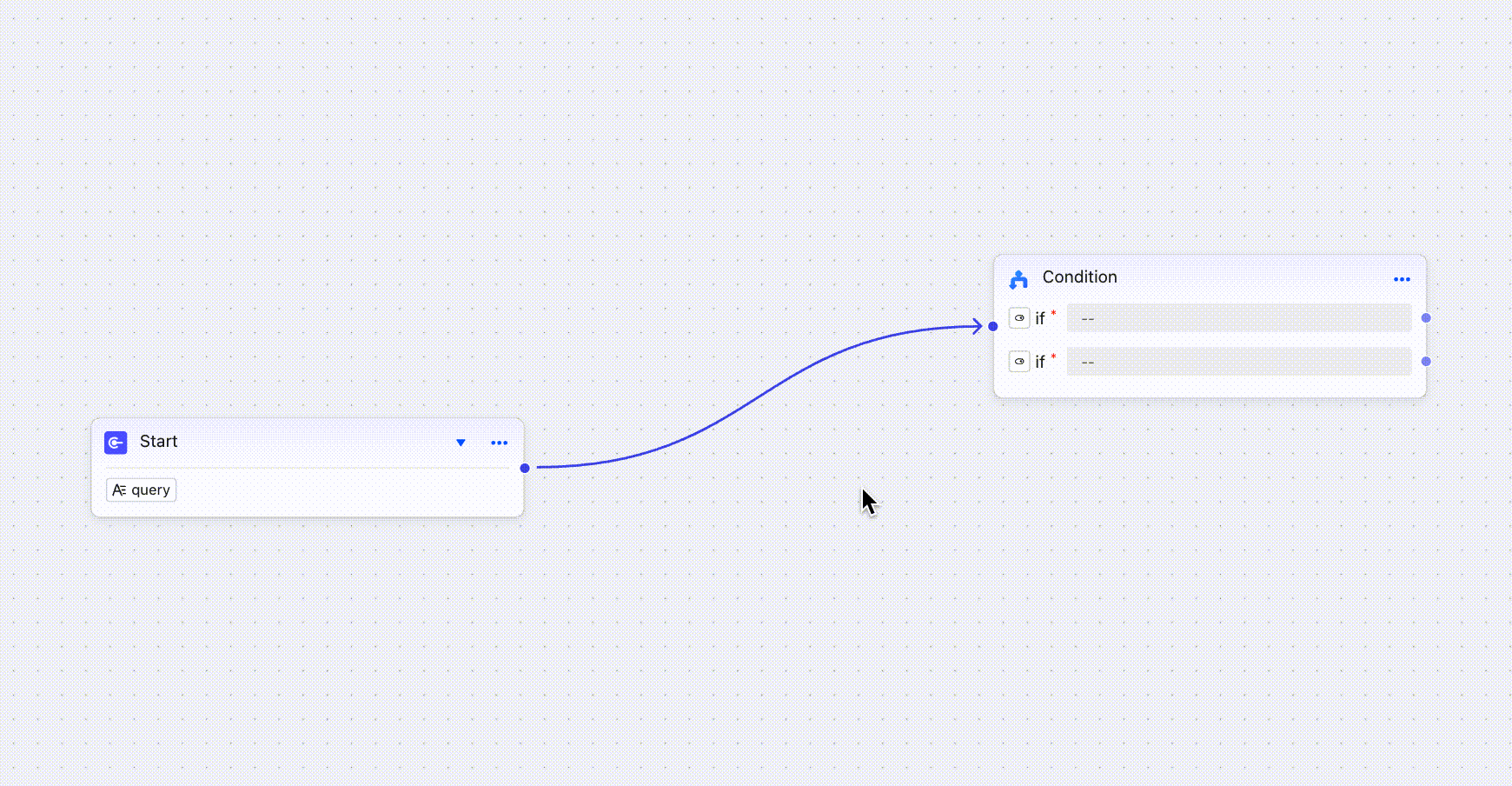#Lines
- WorkflowLinesManager manages all lines
- WorkflowNodeLinesData manages lines connected to nodes
- WorkflowLineEntity line entity
#Get All Line Entities
const allLines = ctx.document.linesManager.getAllLines() // line entities containing from/to representing connected nodes#Create/Delete Lines
// from and to are the node IDs to connect, fromPort, toPort are port IDs, if node has single port can be omitted
const line = ctx.document.linesManager.createLine({ from, to, fromPort, toPort })
// delete line
line.dispose()#Export Line Data
Basic line structure:
- sourceNodeID:
stringsource node id - targetNodeID:
stringtarget node id - sourcePortID?:
string | numbersource port id, defaults to node's default port if omitted - targetPortID?:
string | numbertarget port id, defaults to node's default port if omitted
const json = ctx.document.linesManager.toJSON()#Get Input/Output Nodes or Lines for Current Node
import { WorkflowNodeLinesData } from '@flowgram.ai/free-layout-editor'
// get input nodes (calculated through connection lines)
node.getData(WorkflowNodeLinesData).inputNodes
// get all input nodes (recursively gets all upstream nodes)
node.getData(WorkflowNodeLinesData).allInputNodes
// get output nodes
node.getData(WorkflowNodeLinesData).outputNodes
// get all output nodes
node.getData(WorkflowNodeLinesData).allOutputNodes
// input lines (contains the line that isDrawing or isHidden)
node.getData(WorkflowNodeLinesData).inputLines
// output lines (contains the line that isDrawing or isHidden)
node.getData(WorkflowNodeLinesData).outputLines
// all availableLines (Doesn't contain the lines that isDrawing or isHidden)
node.getData(WorkflowNodeLinesData).availableLines#Line Configuration
We provide rich line configuration parameters for FreeLayoutEditorProvider, see details in FreeLayoutProps
interface FreeLayoutProps {
/**
* Line color configuration
*/
lineColor?: LineColor;
/**
* Determine if line should be marked red
* @param ctx
* @param fromPort
* @param toPort
* @param lines
*/
isErrorLine?: (ctx: FreeLayoutPluginContext, fromPort: WorkflowPortEntity, toPort: WorkflowPortEntity | undefined, lines: WorkflowLinesManager) => boolean;
/**
* Determine if port should be marked red
* @param ctx
* @param port
*/
isErrorPort?: (ctx: FreeLayoutPluginContext, port: WorkflowPortEntity) => boolean;
/**
* Determine if port should be disabled
* @param ctx
* @param port
*/
isDisabledPort?: (ctx: FreeLayoutPluginContext, port: WorkflowPortEntity) => boolean;
/**
* Determine if line arrow should be reversed
* @param ctx
* @param line
*/
isReverseLine?: (ctx: FreeLayoutPluginContext, line: WorkflowLineEntity) => boolean;
/**
* Determine if line arrow should be hidden
* @param ctx
* @param line
*/
isHideArrowLine?: (ctx: FreeLayoutPluginContext, line: WorkflowLineEntity) => boolean;
/**
* Determine if line should show flowing effect
* @param ctx
* @param line
*/
isFlowingLine?: (ctx: FreeLayoutPluginContext, line: WorkflowLineEntity) => boolean;
/**
* Determine if line should be disabled
* @param ctx
* @param line
*/
isDisabledLine?: (ctx: FreeLayoutPluginContext, line: WorkflowLineEntity) => boolean;
/**
* Line drag end
* @param ctx
* @param params
*/
onDragLineEnd?: (ctx: FreeLayoutPluginContext, params: onDragLineEndParams) => Promise<void>;
/**
* Set line renderer type
* @param ctx
* @param line
*/
setLineRenderType?: (ctx: FreeLayoutPluginContext, line: WorkflowLineEntity) => LineRenderType | undefined;
/**
* Set line style
* @param ctx
* @param line
*/
setLineClassName?: (ctx: FreeLayoutPluginContext, line: WorkflowLineEntity) => string | undefined;
/**
* Whether to allow line creation
* @param ctx
* @param fromPort - start point
* @param toPort - target point
*/
canAddLine?: (ctx: FreeLayoutPluginContext, fromPort: WorkflowPortEntity, toPort: WorkflowPortEntity, lines: WorkflowLinesManager, silent?: boolean) => boolean;
/**
* Whether to allow line deletion
* @param ctx
* @param line - target line
* @param newLineInfo - new line info
* @param silent - if false, can show toast
*/
canDeleteLine?: (ctx: FreeLayoutPluginContext, line: WorkflowLineEntity, newLineInfo?: Required<WorkflowLinePortInfo>, silent?: boolean) => boolean;
/**
* Whether to allow line reset
* @param fromPort - start point
* @param oldToPort - old connection point
* @param newToPort - new connection point
* @param lines - line manager
*/
canResetLine?: (ctx: FreeLayoutPluginContext, fromPort: WorkflowPortEntity, oldToPort: WorkflowPortEntity, newToPort: WorkflowPortEntity, lines: WorkflowLinesManager) => boolean;
}#1. Line ui state configuration
- update UI state
/**
* more: https://github.com/bytedance/flowgram.ai/blob/main/packages/canvas-engine/free-layout-core/src/entities/workflow-line-entity.ts#L41
*/
line.updateUIState({
lockedColor: 'blue',
strokeWidth: 2,
strokeWidthSelected: 3,
className: 'xxx',
style: {}
})- Different lines specify a specific color (highest priority)
ctx.document.linesManager.getAllLines().forEach(line => {
if (line.from.flowNodeType === 'start') {
line.lockedColor = 'blue'
} else if (line.to.flowNodeType === 'end') {
line.lockedColor = 'yellow'
}
})
- Global color configuration
function App() {
const editorProps: FreeLayoutProps = {
lineColor: {
hidden: 'transparent',
default: '#4d53e8',
drawing: '#5DD6E3',
hovered: '#37d0ff',
selected: '#37d0ff',
error: 'red',
flowing: '#ff6b35', // Color for flowing lines (e.g., during workflow execution)
},
// ...others
}
return (
<FreeLayoutEditorProvider {...editorProps}>
<EditorRenderer className="demo-editor" />
</FreeLayoutEditorProvider>
)
}#2. Limit Single Output Port to One Line

function App() {
const editorProps: FreeLayoutProps = {
/*
* Check whether the line can be added
*/
canAddLine(ctx, fromPort, toPort) {
// not the same node
if (fromPort.node === toPort.node) {
return false;
}
// control number of lines
if (fromPort.availableLines.length >= 1) {
return false
}
return true;
},
// ...others
}
return (
<FreeLayoutEditorProvider {...editorProps}>
<EditorRenderer className="demo-editor" />
</FreeLayoutEditorProvider>
)
}#3. Connect to blank area to add node
See free layout best practices for code

function App() {
const editorProps: FreeLayoutProps = {
/**
* Drag the end of the line to create an add panel (feature optional)
* 拖拽线条结束需要创建一个添加面板 (功能可选)
*/
async onDragLineEnd(ctx, params) {
const { fromPort, toPort, mousePos, line, originLine } = params;
if (originLine || !line) {
return;
}
if (toPort) {
return;
}
// Here you can open the add panel based on mousePos
await ctx.get(WorkflowNodePanelService).call({
fromPort,
toPort: undefined,
panelPosition: mousePos,
enableBuildLine: true,
panelProps: {
enableNodePlaceholder: true,
enableScrollClose: true,
},
});
},
// ...others
}
return (
<FreeLayoutEditorProvider {...editorProps}>
<EditorRenderer className="demo-editor" />
</FreeLayoutEditorProvider>
)
}#4. Custom Arrow Renderer
You can completely customize the line arrow styles by registering custom arrow renderers.
import {
FlowRendererKey,
type ArrowRendererProps,
useEditorProps
} from '@flowgram.ai/free-layout-editor';
// 1. Create custom arrow component
function CustomArrowRenderer({ id, pos, reverseArrow, strokeWidth, vertical, hide }: ArrowRendererProps) {
if (hide) return null;
const size = 8;
const rotation = reverseArrow
? (vertical ? 270 : 180)
: (vertical ? 90 : 0);
return (
<g
id={id}
transform={`translate(${pos.x}, ${pos.y}) rotate(${rotation})`}
>
<path
d={`M0,0 L${-size},-${size/2} L${-size},${size/2} Z`}
fill="currentColor"
strokeWidth={strokeWidth}
stroke="currentColor"
/>
</g>
);
}
// 2. Register custom arrow in editor
function App() {
const materials = {
components: {
[FlowRendererKey.ARROW_RENDERER]: CustomArrowRenderer,
},
};
const editorProps = useEditorProps({
materials,
// ...other configs
});
return (
<FreeLayoutEditorProvider {...editorProps}>
<EditorRenderer className="demo-editor" />
</FreeLayoutEditorProvider>
);
}Advanced Usage: Dynamically render different arrow styles based on line state:
function AdvancedArrowRenderer({ id, pos, reverseArrow, strokeWidth, vertical, hide, line }: ArrowRendererProps) {
if (hide) return null;
const size = 8;
const rotation = reverseArrow
? (vertical ? 270 : 180)
: (vertical ? 90 : 0);
// Choose different arrow styles based on line state
let arrowPath: string;
let fillColor: string;
if (line?.hasError) {
// Error state: red exclamation arrow
arrowPath = `M0,0 L${-size},-${size/2} L${-size},${size/2} Z`;
fillColor = '#ff4d4f';
} else if (line?.processing) {
// Processing state: blue circular arrow
arrowPath = `M0,0 m-${size/2},0 a${size/2},${size/2} 0 1,0 ${size},0 a${size/2},${size/2} 0 1,0 -${size},0`;
fillColor = '#1890ff';
} else {
// Default state: standard triangle arrow
arrowPath = `M0,0 L${-size},-${size/2} L${-size},${size/2} Z`;
fillColor = 'currentColor';
}
return (
<g
id={id}
transform={`translate(${pos.x}, ${pos.y}) rotate(${rotation})`}
>
<path
d={arrowPath}
fill={fillColor}
strokeWidth={strokeWidth}
stroke={fillColor}
/>
</g>
);
}ArrowRendererProps Interface:
interface ArrowRendererProps {
id: string; // Arrow unique identifier
pos: { x: number; y: number }; // Arrow position
reverseArrow: boolean; // Whether to reverse arrow direction
strokeWidth: number; // Line thickness
vertical: boolean; // Whether it's a vertical line
hide: boolean; // Whether to hide the arrow
line?: WorkflowLineEntity; // Line entity (can be used to get state)
}#Add Label to Line
See code in free layout best practices

import { createFreeLinesPlugin } from '@flowgram.ai/free-lines-plugin';
const editorProps = {
plugins: () => [
/**
* Line render plugin
*/
createFreeLinesPlugin({
renderInsideLine: LineAddButton,
}),
]
}#Node Listening to Its Own Line Changes and Refresh
import {
useRefresh,
WorkflowNodeLinesData,
} from '@flowgram.ai/free-layout-editor';
function NodeRender({ node }) {
const refresh = useRefresh()
const linesData = node.get(WorkflowNodeLinesData)
useEffect(() => {
const dispose = linesData.onDataChange(() => refresh())
return () => dispose.dispose()
}, [])
return <div>xxxx</div>
}#Listen to All Line Connection Changes
This scenario is used when you want to monitor line connections in external components
import { useEffect } from 'react'
import { WorkflowLinesManager, useRefresh } from '@flowgram.ai/free-layout-editor'
function SomeReact() {
const refresh = useRefresh()
const linesManager = useService(WorkflowLinesManager)
useEffect(() => {
const dispose = linesManager.onAvailableLinesChange(() => refresh())
return () => dispose.dispose()
}, [])
console.log(ctx.document.linesManager.getAllLines())
}